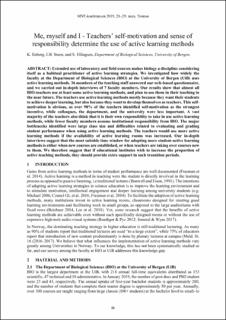Me, myself and I -Teachers’ self-motivation and sense of responsibility determine the use of active learning methods
Journal article, Peer reviewed
Published version

Åpne
Permanent lenke
https://hdl.handle.net/11250/2764554Utgivelsesdato
2019Metadata
Vis full innførselSamlinger
- Department of Biological Sciences [2289]
- Registrations from Cristin [10402]
Sammendrag
Extended use of laboratory and field courses makes biology a discipline considering itself as a habitual practitioner of active learning strategies. We investigated how widely the faculty at the Department of Biological Sciences (BIO) at the University of Bergen (UiB) uses active learning methods. 36 members of the teaching staff answered our web-based questionnaire, and we carried out in-depth interviews of 7 faculty members. Our results show that almost all BIO-teachers use at least some active learning methods, and plan to use them in their teaching in the near future. The teachers use active learning methods mostly because they want their students to achieve deeper learning, but also because they want to develop themselves as teachers. This selfmotivation is obvious, as over 90% of the teachers identified self-motivation as the strongest incentive, while colleagues, the department, and the university were less important. A vast majority of the teachers also think that it is their own responsibility to take in use active learning methods, while fewer faculty members assume institutional responsibility from BIO. The major bottlenecks identified were large class size and difficulties related to evaluating and grading student performance when using active learning methods. The teachers would use more active learning methods if the availability of active learning rooms was increased. Our in-depth interviews suggest that the most suitable time window for adopting more student-active learning methods is either when new courses are established, or when teachers are taking over courses new to them. We therefore suggest that if educational institutes wish to increase the proportion of active teaching methods, they should provide extra support in such transition periods.
